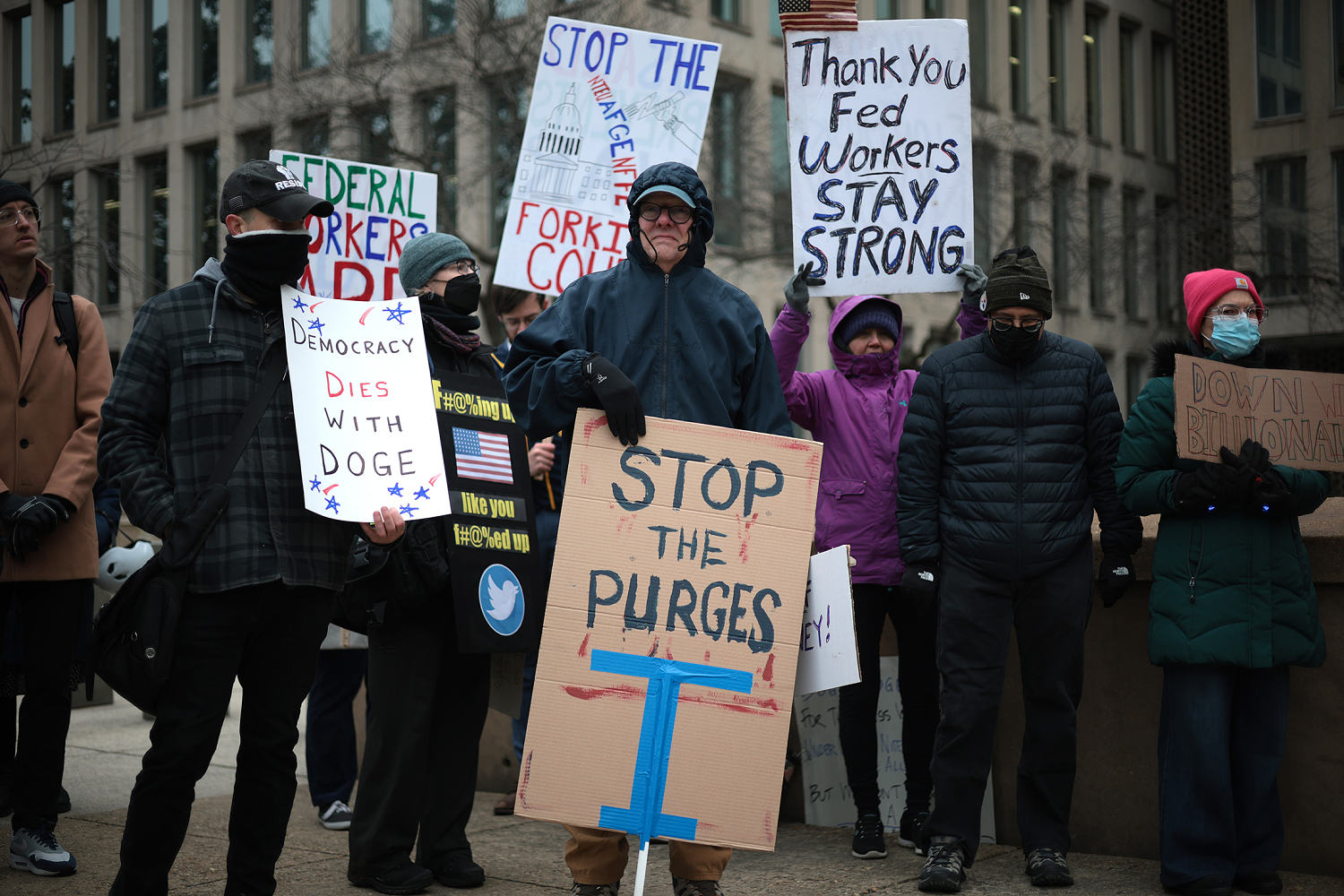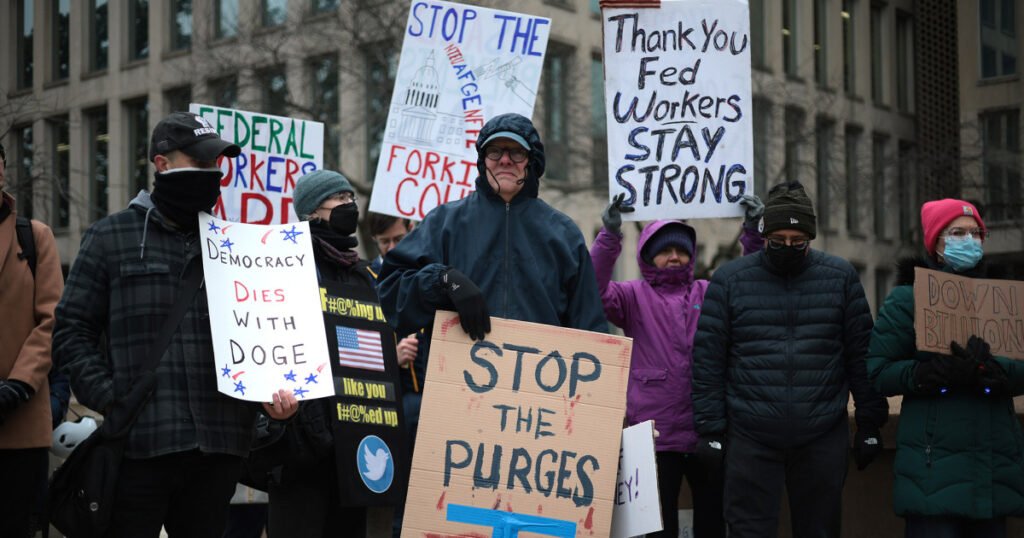
As millions of federal workers face a looming deadline to decide whether to accept the Trump administration’s unprecedented buyout offer, questions remain over whether the plan is even valid without Congress’ approval, according to interviews with federal law and labor experts.
More than 60,000 employees have already agreed to resign as part of President Donald Trump’s effort to rapidly reduce the government workforce, with more being coaxed to take the deal ahead of a Monday deadline.
That same day, a federal judge in Boston is expected to hear arguments over the merits of the “deferred resignation” program, which is being challenged by several labor unions.
“I think this program is likely to be struck down,” said Justin Schnitzer, a managing partner at Fedelaw, a Maryland law firm that specializes in federal employment cases. “You see, in some of these emails, the administration says workers who take the buyout can ‘go on their dream vacation,’ things like that — but that’s clearly not how Congress appropriated funds.”
Stephanie Rapp-Tully, a partner at the law firm Tully Rinckey who practices federal employment law, said the administration is making claims it can’t guarantee.
“The government cannot promise future pay if it’s not authorized or appropriated by Congress,” Rapp-Tully said. “That’s a major concern.”
Congress hasn’t appropriated funding beyond March 14, as the prospect of a government shutdown looms unless a bipartisan deal can be reached amid Trump’s sweeping agenda to unilaterally reshape the government.
The initial Jan. 28 email, with the subject line “Fork in the Road,” was directed toward roughly 2 million federal employees deemed eligible for “deferred resignation.” The pitch: If they reply with the word “resign,” they will be exempted from all in-person work requirements and can continue collecting salaries and earning benefits through Sept. 30.
Tech billionaire Elon Musk’s Department of Government Efficiency, an office in the Trump administration focused on slashing government spending, attempted to appeal to workers, writing on X: “Can take the vacation you always wanted, or just watch movies and chill, while receiving your full government pay and benefits.”
But in a memo Tuesday from the U.S. Office of Personnel Management attempting to assure employees the offer is “legally binding,” officials appeared to tamp down on the idea of a sudden vacation for all participants.
“Those assurances are binding on the government,” the memo adds. “Were the government to backtrack on its commitments, an employee would be entitled to request a rescission of his or her resignation.”
The memo said most employees would be expected to assist with “transition” duties and would then be “placed on administrative leave for the bulk of the deferred resignation period.” The memo later clarified, “The decision to grant administrative leave, and for how long, lies largely within the agency’s discretion.”
And in a sample agreement included in the memo, employees must agree to certain terms, including that only an agency head can rescind the agreement, except under limited circumstances, and an employee “forever waives, and will not pursue through any judicial, administrative, or other process, any action against” their agency.
If the government decides not to pay employees who chose to resign under the program through the promised Sept. 30 date, it’s unclear whether they would have any rights to seek what they were promised, Rapp-Tully said.
“The agreement that was sent out as a draft agreement at most agencies has language in it that requires waiver of any and all claims, so that calls into question whether there can be any sort of challenge to the enforceability,” Rapp-Tully said.
Debra D’Agostino, founding partner of the Federal Practice Group in Washington, D.C., who leads the firm’s federal employment law team, said the details in the agreement must be carefully reviewed by potential takers.
“It’s notable that, at first, it was just ‘respond to this email and you’re all set,’ but then, as the week went on, they sent out that template agreement that looks much more like a typical severance agreement,” D’Agostino said. “I think that agreement demonstrates more understanding from both parties as to what would be involved. It says employees would be waiving any and all claims, even claims they don’t know they have right now but maybe should know.”
Workers in at least one agency, the Education Department, were told that if they accept the resignation package, the education secretary may later cancel it and employees would not have any recourse, potentially leaving them without promised pay. A new education secretary has not yet been confirmed.
Some employees across the federal government who spoke with NBC News expressed anguish over taking the deal by the original Thursday deadline. With just hours to spare, U.S. District Judge George O’Toole Jr. paused the program pending a hearing on Monday to weigh arguments.
“It’s a scam and not a buyout,” Everett Kelley, president of the American Federation of Government Employees, said following the judge’s ruling.
Sen. Tim Kaine, D-Va., praised the judge’s decision and argued the Trump administration has “no clear authority to offer this deal.”
“Recent reporting has indicated that the Trump Administration added clauses to the deal that allow the Administration to cancel it at any time, leaving federal employees without pay, as well as requiring federal employees who accept the so-called buyout to waive their rights to any legal recourse,” he said in a statement.
The OPM denied its program was being blocked or canceled, and White House press secretary Karoline Leavitt responded in a statement that the administration was still pressing ahead: “We are grateful to the Judge for extending the deadline so more federal workers who refuse to show up to the office can take the Administration up on this very generous, once-in-a-lifetime offer.”
Legal experts contend it will be an uphill battle for employees who may have buyer’s remorse having signed the agreement.
“Usually, when someone resigns from a job, there are no legal avenues, unless there are unique circumstances like they were legally compelled to do it,” Rapp-Tully said. “I don’t know if this will be interpreted as anything other than voluntarily. If the government doesn’t follow through or doesn’t make the payment, someone could rescind their resignation — but would the government be compelled to reinstate the employee? I’m not sure they would be.”
Tom Spiggle, a Washington, D.C., employment lawyer, said he’s been fielding multiple calls from government workers asking him about taking the offer. The agreement, he said, may be enforceable — “you’ve signed a contract” — but workers should know that “the government still holds all the cards.”
“You’re relying on the good graces of Elon Musk and the administration that they can really get this done,” Spiggle said.
Source link



